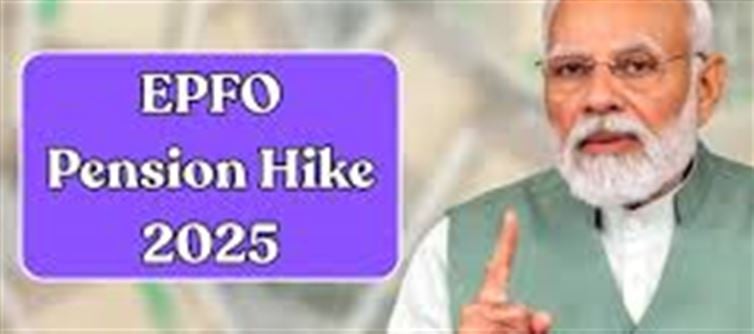
As diwali approaches, a significant piece of good news is coming for pensioners in india, especially those under the Employees' Provident Fund Organisation (EPFO)'s Employees' Pension Scheme (EPS)-95. Reports indicate that the minimum pension for those enrolled under EPS-95 may be increased from ₹1,000 to around ₹2,500. This move is expected to bring much-needed financial relief and security to pensioners who rely on these pensions for their daily needs. Here's a breakdown of what this increase means and why it’s being implemented:
1. What Is the Employees’ Pension Scheme (EPS) 95?
The Employees' Pension Scheme (EPS)-95 is a social security scheme under the EPFO, designed to provide pensions to employees in the organized sector after their retirement. The scheme is part of the EPF (Employees' Provident Fund), which is a compulsory savings scheme for salaried employees in India.
· Eligibility: Employees who have contributed to the EPF are automatically enrolled in the EPS-95 scheme.
· Pension Calculation: The pension under EPS-95 is determined based on the average monthly salary and the number of years of service. However, the minimum pension has been a major concern for many years, as it hasn’t seen a significant hike in recent times.
2. What’s Changing? The ₹2,500 Minimum Pension
Currently, pensioners enrolled under the EPS-95 scheme receive a minimum monthly pension of ₹1,000. This amount is considered insufficient for many pensioners, especially given the rising costs of living. The proposed increase of ₹2,500 will help raise the financial security of millions of pensioners.
· Current Minimum Pension: ₹1,000 per month.
· Proposed Minimum Pension: ₹2,500 per month.
This change is expected to affect around 65 lakh pensioners who currently receive the minimum pension. The raise will be a welcomed relief, especially as it comes before Diwali, adding an element of financial security and festive cheer for these retirees.
3. Why Is the Pension Hike Being Proposed?
The move to increase the minimum pension is largely in response to ongoing demands from various pensioner associations, which have long argued that the existing pension is not enough to meet basic living expenses. The increase is being considered as a way to:
· Address Inflation: The current pension amount has remained stagnant for years, while the cost of living, particularly in urban areas, has risen sharply.
· Boost Financial Security: Many pensioners rely solely on this income after retirement, so increasing the pension amount will provide them with better financial stability and dignity in their later years.
· Prepare for Diwali: The increase is timed ahead of Diwali, India’s biggest festival, which is traditionally a time for financial gifting and celebrations. This adjustment is seen as a diwali gift for those who have spent their working years contributing to the nation’s economy.
4. What Will This Mean for Pensioners?
For pensioners receiving the minimum pension under EPS-95, this increase could have a significant impact on their financial well-being:
· Increased Disposable Income: An additional ₹1,500 per month will help pensioners cover daily expenses, healthcare costs, and other necessities that may have become unaffordable on the previous pension amount.
· Reduced Financial Strain: With the added relief, pensioners may find it easier to manage inflationary pressures, particularly with rising costs of essential goods and services.
· Timely Relief: Since this adjustment is expected before diwali, pensioners will have the benefit of extra financial support during the festive season, a time when families often spend on celebrations, gifts, and other festivities.
5. How Will This Impact the EPFO and Government?
This proposed increase comes as part of ongoing efforts by the Government of India and the EPFO to ensure that pension schemes evolve with the changing economic conditions. However, the move also raises questions about the sustainability of the scheme and the financial burden it might place on the EPFO and the government’s budget.
· Financial Sustainability: To fund the hike in pensions, there may be a need for increased contributions or adjustments in the long-term funding of the EPS-95 scheme.
· Government’s Commitment: The government’s focus on enhancing social security schemes like EPS-95 aligns with its goal to improve the financial security of the elderly population, which remains a significant demographic in the country.
6. What Are the Next Steps?
· Official Notification: The official confirmation of the pension increase will likely come from the EPFO or the Ministry of Labour and Employment. Pensioners and their families are advised to stay updated through the official channels and websites for precise details and timings.
· Pensioner Associations’ Role: Various pensioner unions and associations are also expected to continue advocating for further improvements in the scheme, including increased coverage, better pension indexing, and more.
Conclusion: A diwali Gift for Pensioners
For those who have worked their entire lives and contributed to the country’s growth, this proposed pension increase comes as a timely diwali gift. While ₹2,500 may still be modest in comparison to the cost of living in urban areas, it’s a significant step in the right direction towards ensuring that senior citizens and retired employees receive a fair, dignified retirement.
This pension hike is a welcome change that should bring relief to pensioners just in time for the festivities and add more brightness to their diwali celebrations.
Disclaimer:
The views and opinions expressed in this article are those of the author and do not necessarily reflect the official policy or position of any agency, organization, employer, or company. All information provided is for general informational purposes only. While every effort has been made to ensure accuracy, we make no representations or warranties of any kind, express or implied, about the completeness, reliability, or suitability of the information contained herein. Readers are advised to verify facts and seek professional advice where necessary. Any reliance placed on such information is strictly at the reader’s own risk..jpg)




 click and follow Indiaherald WhatsApp channel
click and follow Indiaherald WhatsApp channel